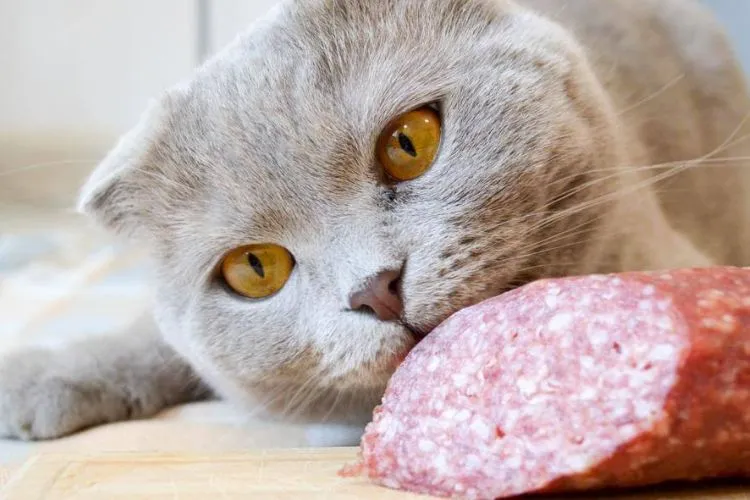As cat owners, it’s not unusual to catch your furry companion eyeing your food with curiosity, perhaps even trying to snag a bite.
Among the various human foods they seem interested in, meats like pepperoni often catch their attention.
But before you toss a slice their way, it’s crucial to understand what feeding your cat pepperoni can entail.
So, can cats have pepperoni?
This guide dives deep into the safety and risks of pepperoni as a treat for your cat, offering you vet-approved advice and healthier alternatives.

🐾 Can Cats Eat Pepperoni?
Pepperoni, a popular American variety of salami, is made from cured pork and beef mixed with spices. This spicy and flavorful meat is a favorite topping on pizzas and a prevalent snack among humans.
However, when it comes to sharing this treat with our feline friends, several considerations come to play. Cats are obligate carnivores, meaning their diet should predominantly consist of meat.
However, the type of meat and its preparation are critical for their health. The spices, high sodium content, and fat levels in pepperoni are not suited for a cat’s digestive system and can lead to several health issues.
🐾 Risks of Feeding Your Cat Pepperoni
The components of pepperoni pose various health risks to cats, which can significantly impact their well-being.
- High Sodium Content: Cats require a minimal amount of sodium in their diets. The excessive salt present in pepperoni can lead to sodium ion poisoning in cats, with symptoms such as vomiting, diarrhea, tremors, and seizures. Moreover, high salt intake can contribute to dehydration and increase the risk of kidney disease and hypertension.
- Spices and Seasonings: Pepperoni is laden with spices and seasonings that are harmful to cats. Ingredients like onion and garlic powder are toxic to cats and can lead to anemia by destroying red blood cells. Other seasonings can cause gastrointestinal irritation, leading to discomfort, vomiting, or diarrhea.
- Fat Content: The high fat in pepperoni is another concerning factor for cat health. Consuming foods with excessive fat can lead to obesity, which is a growing concern among indoor cats. Moreover, it can cause pancreatitis, a painful and potentially life-threatening condition.
🐾 Understanding Your Cat’s Nutritional Needs
Cats have specific nutritional requirements that are vastly different from humans. Their diet needs to be rich in proteins and amino acids, particularly taurine, which is essential for heart health, vision, and reproduction.

The nutritional profile of pepperoni does not meet these requirements. Instead, it introduces elements that can disrupt their health balance and contribute to long-term issues.
🐾 What to Do If Your Cat Eats Pepperoni
Accidental ingestion of pepperoni by your cat can happen, especially if they’re quick to snatch food off your plate. If your cat eats a small amount of pepperoni, closely monitor them for any adverse reactions.
Symptoms to watch for include excessive thirst, lethargy, or gastrointestinal distress. If your cat displays severe symptoms or if you’re concerned about their well-being, contact your veterinarian immediately.
They may offer advice specific to your cat’s health needs or request a visit if they believe the ingestion has led to a serious condition.
🐾 Healthy Alternatives to Pepperoni for Cats
Instead of pepperoni or other processed meats, consider offering your cat treats that are beneficial to their health. Small pieces of cooked chicken, turkey, or fish can be excellent snacks, provided they are prepared without any added salt, spices, or fat.
Commercially available cat treats are formulated to be both safe and appealing for cats, often fortified with vitamins and minerals essential for their health.
Remember, treats should only make up a small portion of your cat’s diet, with a balanced commercial cat food serving as their primary source of nutrition.
🐾 Pro Tips
Incorporate treats into your cat’s diet sparingly to prevent obesity and ensure they receive a balanced diet. Introduce new foods gradually and in small amounts, monitoring your cat for any adverse reactions.

Your cat’s health and happiness are paramount, and choosing the right treats plays a crucial role in their well-being.
🐾 Frequently Asked Questions (FAQs)
While pepperoni is unlikely to be lethal for cats, its harmful ingredients can cause significant health issues and discomfort for your feline friend. Avoid offering pepperoni to prevent any risk to their health.
It’s best to avoid giving cats pepperoni pizza. Aside from the risks presented by pepperoni, pizza dough and cheese can also be unhealthy for cats, contributing to gastrointestinal upset and potential lactose intolerance issues.
Turkey pepperoni might have slightly less fat than its pork counterpart, but it still contains high levels of sodium and seasonings harmful to cats. It’s better to steer clear of any form of pepperoni when it comes to your cat’s treats.
Conclusion:
While sharing food with our pets can stem from a place of love, it’s essential to prioritize their health and nutritional needs. Pepperoni, with its high sodium, fat content, and seasonings, is not a safe treat for cats.
Alternatives like small, cooked pieces of plain meats or specially formulated cat treats are much better options for rewarding your furry friend.
Always remember, when in doubt about feeding your cat any human food, consult with your veterinarian to ensure it’s safe for their specific dietary needs.
